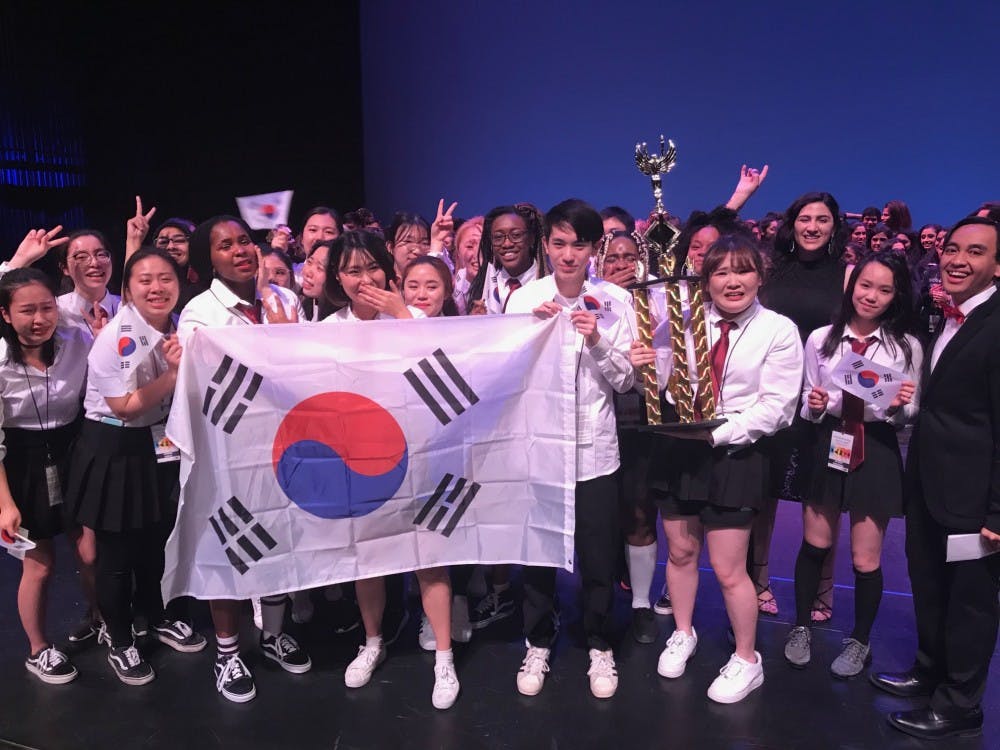Inha Jung remembers a time when her club did not have a set room.
The Korean Student Association and Kasanova Dance Team had to travel around North Campus looking for a space to practice last year. The group would go from the Richmond Hall gym to the Student Union Flag Room looking for a vacancy.
The club, which has grown in the last year by accepting students of different cultures, won first place at the Student Association’s annual International Fiesta dance competition Saturday.
It was their first time competing.
Jung, the KSA president and a sophomore business major, said she never expected the group to win the competition.
“After they announced second and third place, I had already told people ‘Guys we had so much fun, it’s totally fine. We really got to show what we wanted to show. They know who KSA is now.’ Just getting on that stage was a big step in itself,” Jung said. “The group before this year didn’t have the courage to go out and perform at International Fiesta. I think a lot of people related to our message, I saw a lot of tears.”
The group performed on the Center for the Arts mainstage on Saturday night to an audience of roughly 1,750 people, according to Elise Helou, international council coordinator. They placed alongside the Malaysian Student Association and Latin American Student Association in SA’s $19,500 competition with 312 performers.
The group’s performance focused on the pressure that Korean youth experience and acknowledged the high suicide rate and the bullying epidemic. The performance followed the Korean students and their journey through cultural and social pressure.
It ended with a depiction of suicide, as members of KSA took to the stage with flowers to memorialize suicide victims.
The group drew inspiration from their own lives. Many members were born in the U.S., but came from ethnic backgrounds where education holds a strong presence.
Jade Olusoji, a sophomore biology major, said she related to the pressure portrayed in their performance.
“Most of us are children of immigrants. Our parents expect for us, since we had the privilege of being born in this country, to at least do this [level of work] when it comes to our studies,” Olusoji said. “They don’t think of it as much as a burden as it actually is on us. Some people think when you fail a test that ‘Oh that’s life,’ but for some of us, failing a test means we can’t go home.”
The similarities they share bring the group together.
KSA managed to exceed expectations with its first performance. The group had to compensate for not having a budget and relied solely on its own members to pay for expenses. Each member bought their own costume and supplied the small props.
Jung initially joined because of her interest in dance, but the group incorporates different elements of Korean culture into their club activities.
The group primarily performs dance covers of Korean pop songs. They also discuss Korean dramas and explore different Korean food.
Jung, within a year as president, grew the club from 10 to 26 members. The club had to reassess its strategy in order to compensate for its negative SA budget, according to Jung. She attributes the group’s growth to the willingness of KSA to accept all members, regardless of the group’s race or ties to Korean culture.
KSA has multiple members that are not of Korean descent, Jung said.
“This is one of the biggest reasons why KSA was inactive before I came. I don’t know what the president thought before, but it used to be ‘KSA is an association just for helping Korean students,’” Jung said. “I never think [my members] are different from me. We are all the same although we look different. We became a team because we all have the same interest in Korea. That’s how I became a leader to such diverse people and friends.”
Olusoji is Nigerian, but was drawn to KSA because of her interest in K-pop.
“It takes a lot, especially since UB is such a big school, to break out of your comfort zone. I have a group of West African friends. I have a group of Asian friends. I have my friends at Kasanova, but obviously when I first came to UB, I was moving with people who I knew shared a similar culture to me,” Olusoji said. “Most people assume that if you join Korean Student Association that you’re Korean, and if you’re not Korean and you join it must be because you fetishize Asians or something like that. We just joined because we like Korean music.”
It is this sense of community that drives KSA members to continue working on their passions.
Charity Nwadike, vice president and sophomore psychology major, aspires to reach a wider range of students.
“Most dancing SAs aim to win International Fiesta and we actually did it, so now we aren’t sure where to go from here,” Nwadike said. “Everyone was like, ‘You have 10 people, how is that going to happen?’ Look at us now. Our next goal is to stand on the stage at Spring Fest. It’s reaching out to an audience of UB students who don’t necessarily know of the international SAs. We’re just looking for more people to make connections with.”
Samantha Vargas is the asst. arts editor and can be reached at samantha.vargas@ubspectrum.com and on Twitter @SamVargasArts.
Samantha Vargas is an English/ film studies double major with a minor in media study. She spends her free time finding shows around buffalo and hanging out with her cat.






